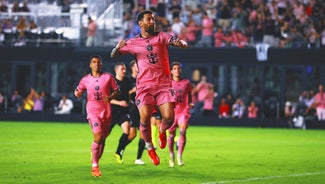
Draw at Azteca another step in USMNT reclaiming its team essence under Arena
MEXICO CITY — It may be the most common word in sports. Team.
We say it so often that it's easy not to think about the rich meanings the word team can have, if you care about all the factors and daily actions that go into what makes a good one. Chemistry. Trust. Belief. Commitment. Sacrifice. Empathy. Discipline. Identity. Pride.
If you listen closely to U.S. men's national team coach Bruce Arena, it's clear that he venerates the word team and everything it represents. He does not toss off the word casually like so many of the rest of us. And so, after the U.S.'s hard-fought 1-1 World Cup qualifying tie against archrival Mexico on Sunday—just the third time ever that the U.S. had picked up a qualifying point at Estadio Azteca—the most meaningful thing Arena said about the U.S. was a simple declarative statement that contained so much more than that.
“They're really becoming a team,” Arena said.
And you know what? He's right. Arena made seven changes to the starting lineup he had used on Thursday in a 2-0 win against Trinidad and Tobago. He said he told his players on the first day of training camp two weeks ago that there would be anywhere from seven to 11 changes, owing to the short turnaround and high altitude, and as recently as Saturday he was going to make nine changes.

On Sunday, in the toughest environment the U.S. will play in all year, Arena put international neophytes Kellyn Acosta, 21, and Paul Arriola, 22, in his starting lineup. Against Mexico. At the Azteca. (He also included 18-year-old Christian Pulisic, but that wasn't a surprise.) All of those young guys were ready for the challenge.
“We have a deep roster,” said Acosta, who was poised in his two-way midfield role next to Michael Bradley. “This shows Bruce has belief in all of us. It's great to see that Bruce can rely on other guys to come into the team and be a part of it and get the results that we need.”
Added Arriola, who was relentless in his running as a winger: “Everyone here is capable of playing. The most important thing is the chemistry. We have a great mix of guys who can provide now and in the future. We shouldn't be talking about us being the future anymore. This was a good game to demonstrate that. Obviously, we didn't have the ball a lot, but tactically being able to stay mentally concentrated the whole time was huge for the young guys.”
Arena communicates with his team. As the coach and several players said on Sunday, Arena told them from the start of camp that there would be different formations in the two games—4-4-2 against Trinidad, 5-4-1 against Mexico—and different players as well. There was a plan, a strategy, and the work that followed came out of that plan. There were no surprises. Everyone knew exactly what was expected of them.

The Americans knew they were going to be out-possessed in a major way against Mexico, and they were, having only 26.4% of possession, the lowest in a U.S. game since June 2013, according to Opta. But that was fine. That was the plan: To absorb possession, concede few scoring chances and counter when the opportunity was there. In the end, Mexico had just one shot on goal.
To hear Bradley, who scored on a mindbending 40-yard chip over Guillermo Ochoa, becoming a team again—becoming the U.S. again—has everything to do with the details, every single day.
“At the end of last year, a lot of little things started to drop,” Bradley said on Sunday. “And when we get our blend right in terms of football, physicality, athleticism, mobility, speed, mentality, spirit—when we get that right, there aren't too many teams in the world that are going to have easy days playing against us, and we feel like we can step on the field and beat anybody.
“But if a few too many areas start to come down, then we're also honest enough with ourselves to understand that our margin is not real big, and then we're going to start putting ourselves in some difficult spots. For me, it was just a case at the end of last year where a few too many areas started to drop. And I think Bruce has done a very good job of coming in and little by little, working at raising the level across the board. A big part of that is this idea of team, of spirit, of mentality, of balls.”

Bradley's insight to his sixth-minute wondergoal was fascinating. He said they had studied a lot of video of Mexico's movements and seen patterns in which Javier “Chicharito” Hernández comes back to the ball and one of Mexico's inside midfielders is looking to run through. Bradley read that situation coming and stepped between Chicharito and Héctor Herrera to steal the ball in the center circle.
As Bradley raced forward, he looked up and saw Ochoa was off his line. Was he surprised? Not at all, said Bradley, who noted the U.S. knows Ochoa well.
“I took the first touch and saw that he was a good ways out. And here you know that if you catch a ball right that with the thin air the ball is really going to fly. I just wanted to make sure I caught it right, and I did.”
There are some healthy contradictions in Arena's U.S. team right now. Arena's sole task is to pick up the pieces for the team's miserable Hexagonal start and make the World Cup by any means necessary—and yet he has given new opportunities to younger players, both in qualifying and at the upcoming Gold Cup that will help the U.S. long after Arena is done being the coach.
What's more, Arena has been known far more for being a man manager than a tactical maven—and yet his embrace of the 5-4-1 and using three center backs (the fantastic Geoff Cameron, Omar González and Tim Ream) revealed a coach who isn't afraid to take a risk and mix things up.
Arena said he decided back in January or February that he would probably go with three center backs at Mexico. And while it took him some time to convince his assistants, they eventually came around.
“We have very good center backs,” Arena said on Sunday. “That's the key to that system. Mexico does an unbelievable job in their spacing. They play players on both [touchlines], so they stretch you out. They like to open you up and attack the gaps between your back line if you're playing a back four. We protected all those spaces.”

Afterward, Arena made sure to thank his veterans who didn't start on Sunday—guys like Clint Dempsey, Fabian Johnson, Jozy Altidore and Tim Howard—for supporting his decisions and backing up the team.
“Most of these players tonight are going to disappear until September, and to leave with the bond they've acquired over the last four games is very important,” Arena said. “So the next time around, I'm optimistic that we can be better in the next two games of qualifying.”
This is how a team becomes, in Arena's way of looking at it, a team, one that's worthy of the name. Welcome back, USMNT.






































































































































